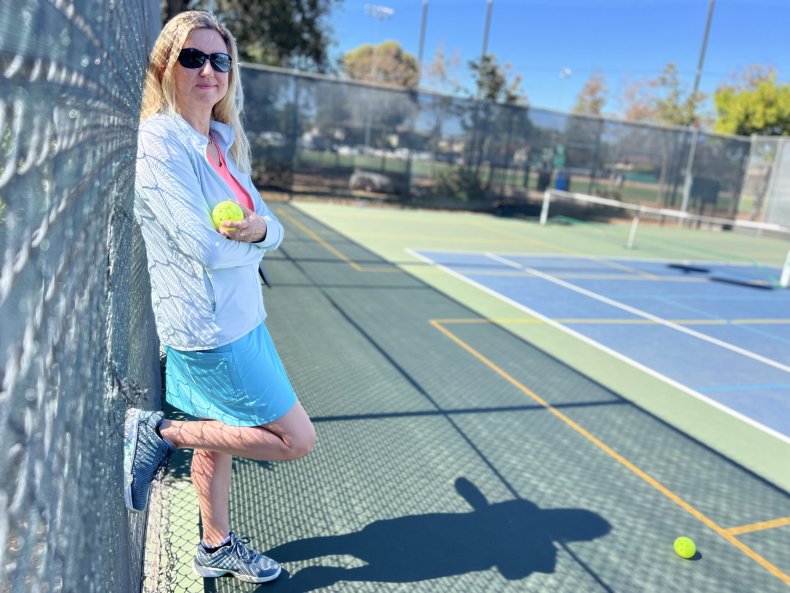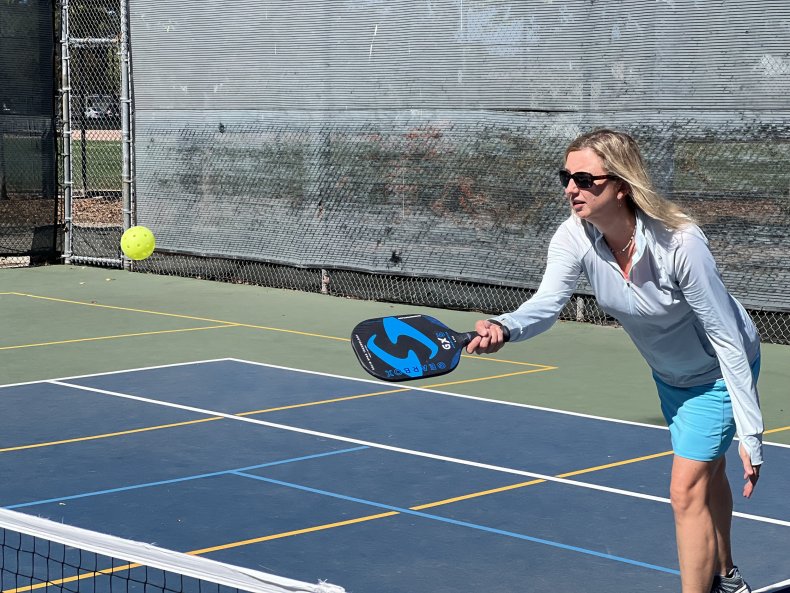For the past three years, most of which was spent negotiating a horrific divorce, I’d wanted to hit something and hit it hard. I’d tried meditation and therapy. Anger still hummed beneath my fingertips, cinched my gut, and taunted the soles of my feet.
Friends prescribed Tinder, as if one-night stands could be hot enough to steam out the stains from custody battles. I bought a pickleball paddle instead.
The sound of the game was what drew me in first—the high decibel pops of paddles cracking down on plastic balls. It cut through the Bay Area fog through to my open windows from the town’s courts one block away, teasing my attention away from the work on my computer screen. One morning in October 2021, I finally gave in and joined the fun.
Returning the bright-green ball back over the net took every ounce of concentration. After day one, when I’d initially leaned back against the court’s cold metal fence like a shy kindergartner, I jumped into game after game, happy to be in motion instead of wondering how much the divorce might have messed up my kids. Pickleball was the first time I could really get out of my noisy head and live in the present. Screw meditation! I left that first day red-cheeked and smiling.
The next morning, I stomped onto the court to smash balls again. Seconds after I exchanged names with the other players, the game was afoot. I still have no idea what I was doing. My first dozen hits sent the ball out of bounds.

KT Ryan
“Just give the ball a soft touch,” said a fit, tan man called David. “You don’t need that much power.”
“I’ll try to restrain myself,” I replied, but the “r” word caught in my throat.
I didn’t want to have to hold back any part of me ever again. My anger was rooted in having walked on eggshells for too long. I glared at my opponents, gripped the neck of my paddle, and began my assault.
Over the next few months, multiple players kindly informed me that banging out balls was not always the right strategy when gentle “dinks” over the net often win the game. But I needed to take the harder-hitting path, early on, to learn how to settle in between the lines of the softer one.
I wasn’t looking for wins. Technique tips about my swing or my stance were secondary to the glorious feeling—the sweet thought of paddle on plastic—of each hit. The intensity of rapid-fire rallies up at the net traveled up and down my spine, releasing years of repressed rage. I thought about showing my therapist my growing collection of cracked balls but worried I’d blurt out that pickleball was healing me faster than her. My mind began reconnecting with my body. I could finally draw air from the depths of my lungs. I gained speed, flexibility, and balance, sensations I hadn’t felt for years.
I was playing almost every day for a few hours and gaining a newfound sense of joy. Even though balls occasionally hit me, leaving me with a fat lip and bruises up and down my shins, the exhilaration from ducking just before a ball careened towards my face made me feel alive.
With my newfound agility—physical and mental—I was learning how to duck other things in life outside of the courts. There, someone will still fling the occasional emotional zinger towards me. Now, they fly past me and land behind instead of smacking me in the heart.

KT Ryan
I’d never been addicted to anything until pickleball. I’m a Peloton-lover and a hoarder of any sugar made by Reese’s. Yet playing pickleball grew into a daily habit. When I’d settled into the rhythm of the game enough to take in who I was playing against, I began meeting people. Pickleball’s drop-in format braids players into each new game, mixing players up into one doubles match after another. Most of the game happens close to the net where talk, laughter, and challenge make us better versions of ourselves.
A few months into my new obsession, a fellow player and I began meeting for pickleball dates late at night. Our pickleball banter soon turned to our scars from our respective divorces.
We’d lob balls back and forth while talking, illuminated by overhead lights that held us there like moths to their warmth. I didn’t care whether these dates led to romance; I was in love with this more peaceful and confident version of myself. I would think: why swipe right when you can pickleball?
Sometimes, when tough memories arise from my past, I’ll slip back into hitting balls harder across the net every single shot. If I’m playing with that divorcee, he’ll nod to me with an unspoken “I get it” on the long road to healing. Those harder than necessary swings—the slam, the whack, and the thwack—are sometimes what’s needed to reset. So, I reset, and then I play on.
KT Ryan is a writer based in the San Francisco Bay Area. She’s working on her memoir, “Get Out of My Head” and can be followed on Twitter at @KTRyanAuthor.
All views expressed in this article are the author’s own.